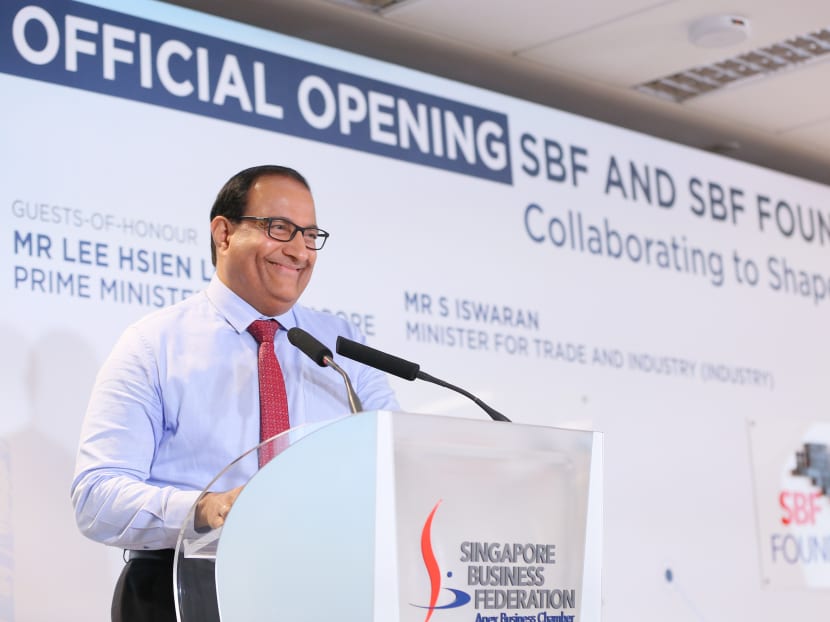Digital push to add 10,000 jobs in trading sector by 2020
SINGAPORE — A new push to digitalise the trading sector and provide skills-based training will help to create 10,000 new jobs by 2020, said Minister for Trade and Industry (Industry) S Iswaran.

Minister of Trade and Industry (Industry) S Iswaran speaking at the opening of the new office of the Singapore Business Federation (SBF), which was attended by Prime Minister Lee Hsien Loong and labour chief Chan Chun Sing. Photo: SBF
SINGAPORE — A new push to digitalise the trading sector and provide skills-based training will help to create 10,000 new jobs by 2020, said Minister for Trade and Industry (Industry) S Iswaran.
Launching the wholesale trade industry transformation map (ITM) at a seminar organised by trade agency International Enterprise (IE) Singapore yesterday, Mr Iswaran noted that the wholesale trade industry employs more than 325,000 people, accounting for 9 per cent of Singapore’s total workforce.
On Tuesday, the Ministry of Trade and Industry announced that from the middle of next year, a new government agency, Enterprise Singapore, would be formed through the merger of IE Singapore and Spring Singapore to drive the transformation of the wholesale trade industry.
“Enterprise Singapore will continue to strengthen partnerships with industry players, trade associations, educational institutions and unions, to develop holistic strategies for the sector.
"With all stakeholders ready to work in concert, businesses and workers in this sector can look forward to becoming stronger enterprises,” said Mr Iswaran.
Last year, wholesale trade contributed S$47.3 billion or 12 per cent to the nation’s gross domestic product. The wholesale trade industry comprises over 34,000 firms, said IE Singapore.
Asia’s rising population, urbanisation and consumerism are propelling the industry’s growth further, in the effort to meet the region’s increased demand for food, infrastructure materials, fuel and electronics, said Mr Iswaran, noting that Singapore is well positioned to benefit from these opportunities.
“We can do so by adapting and staying open to innovation and new networks. This will require the right business models and government programmes to support transformation at the industry, enterprise and individual levels,” he added.
However, trade protectionism and technological disruptions are transforming the global marketplace, and there is a growing need to relook business models and job functions, according to IE Singapore.
“External volatility and digital technology are changing how trade is conducted. Companies need to transform business models and be equipped with new skillsets.
"A strong core of Singaporean talent and companies will underpin our sustainability and long-term success,” said Mr Lee Ark Boon, CEO of IE Singapore.
Developed in consultation with a wide range of key stakeholders, the wholesale trade ITM charts out strategies to ensure the sector remains relevant.
This includes the building of digital marketplaces and platforms, strengthening enterprise capabilities, growing a vibrant ecosystem of trading enterprises, and developing industry-ready talent equipped with deep skills for digitalisation and internationalisation.
Creating new opportunities for the workforce would be a priority, as demand for specialised talent with digital skillsets such as digital marketing, global supply chain and data analytics is expected to grow.
To help build up talent, IE Singapore is partnering industry players and institutes of higher learning to prepare professionals, managers, executives and technicians (PMETs) and students for careers in the trade industry.
At the launch event, memoranda of understanding were signed with partners to build talent with the right skillsets for the industry. This included an agreement with the Singapore Business Federation to place PMETs into a market immersion training programme in the South-east Asia Ready Talent scheme.
IE Singapore also signed an agreement with the Singapore University of Social Sciences to develop a Certificate programme in International Trade targeted at PMETs looking to develop specialised skillsets in areas such as digitalisation, analytics and regional cultural intelligence.
IE Singapore and Ngee Ann Polytechnic will work to jointly develop a Diploma programme in International Trade and Business.
Singapore will also explore ways to set up a regional digital trade facilitation platform to connect with countries in the Association of South-east Asian Nations, led by the Singapore Logistics Association.
This initiative, expected to be ready by the fourth quarter, will allow firms to benefit from custom clearance through a single window and enable wholesale traders in the region to move goods across borders in a more efficient and cost-effective manner, said Mr Iswaran.









